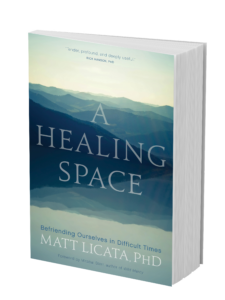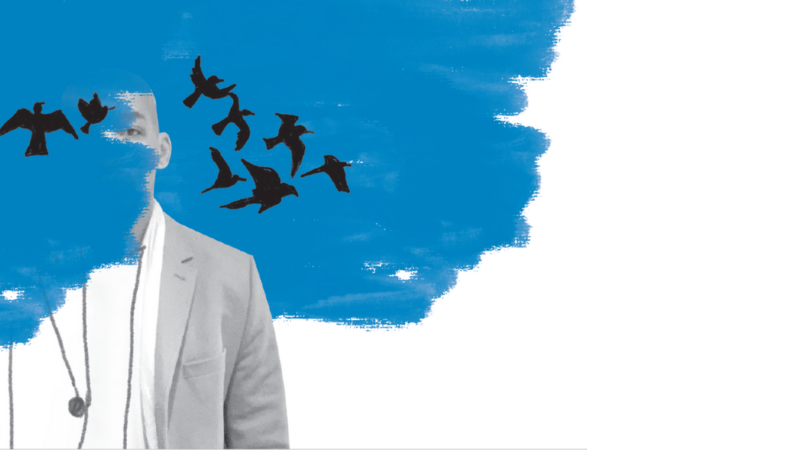Meditation with Eckhart Tolle
Is it possible for meditation to be utterly effortless? To experience the depths of being in any given moment of our lives—not just while we practice? Not only is it possible, explains Eckhart Tolle, but it is the very way we come to touch the essence of meditation.
With Meditation: Practicing Presence in Every Moment of Your Life, we join this treasured teacher as he discusses the many methods of meditation and their shared purpose: accessing the richness and power of pure presence.
In its deepest sense, meditation is never a means to an end. It is about fully being and honoring the entire range of our experience—what Eckhart calls saying yes. Whether you’re just starting a practice or looking to go deeper than ever before, Meditation offers vital insights for anyone eager to taste the fruits of this revered discipline.
Mindfulness-Based Stress Reduction – now offered totally online!
Dear friends, we are honored and excited to bring you the first ever Mindfulness-Based Stress Reduction program delivered in a fully online format. Now you enjoy and benefit from the very same curriculum that has been offered in-person in the comfort of your own home, in a self-paced, interactive training program.
In 1979, Jon Kabat-Zinn founded the Stress Reduction Clinic at the University of Massachusetts to bring a form of meditation known as mindfulness into the medical mainstream. Mindfulness is a basic human quality, a way of learning to pay attention to whatever is happening in your life that allows you a greater sense of connection to your life inwardly and outwardly. Mindfulness is also a practice, a systematic method aimed at cultivating clarity, insight, and understanding. In the context of your health, mindfulness is a way for you to experientially learn to take better care of yourself by exploring and understanding the interplay of mind and body and mobilizing your own inner resources for coping, growing, and healing.
Nearly three decades of scientific research at medical centers all over the world suggest that training in mindfulness and MBSR can positively and often profoundly affect participants’ ability to reduce medical symptoms and psychological distress while learning to live life more fully.
Since its inception, more than 20,000 people have completed the MBSR training program. They have been referred by more than 5,000 physicians, by hundreds of other health care professionals, and through self-referral. These participants have been strongly motivated to do something for themselves—something no one else can do for them—by learning to draw upon their inner resources and natural capacity for greater health as well as balance, ease, and peace of mind.
The MBSR Online Course is the only complete online training in MBSR and follows the same, well-respected method taught at the Center for Mindfulness in Medicine, Health Care, and Society at the University of Massachusetts Medical School. This eight-week course offers the curriculum and methodology developed by Jon-Kabat Zinn and is taught by Center for Mindfulness director Dr. Saki Santorelli, and senior instructor Florence Meleo-Meyer.
If the only prayer you ever say in your whole life is “thank you,” that would suffice…
If the only prayer you ever say in your whole life is “thank you,” that would suffice. -Meister Eckhart
We are quite sure that tomorrow will come, that the most sacred in-breath and out-breath will be there, that grace will take shape as the sun falling into the ocean, that the love that animates this body will continue to take form in such a rare way. But some part of us knows that it is really so fragile here, so precarious, so extraordinary, that this life is not what we think, and that it will be returned to love very soon. It is too much, though, to let this in all the way, as we know that do so would change everything.
We really are on borrowed time, a loan of grace directly from the cells of the heart of the beloved. Yet we know that she will be asking for this unbearably precious gift to be returned soon, so that she may recycle the uniqueness that you are and swirl it out through this and all universes. She will paint the stars in the sky with the essence of what you are, with the signature of your unique soul, and with each and every light strand of your DNA. She will take every word of sweetness that you have ever uttered, every act of kindness you have ever performed, every moment of humility and longing in your heart, and use it to touch sentient life everywhere. And what you are will then pour through every shooting star that will ever fall through the sky again, into eternity; the dust of the stars and the dust of your heart weaved back into one substance.
So let us take just a moment and say thank you, and to get real clear about what it is we are ready to give, what is really and truly most important, and what is falling away.

Why We Need To Live the Full Spectrum of Human Experience
Metabolizing Experience
In order to know and befriend ourselves at the deepest levels, one of the core foundations for true healing, we must cultivate a new way of relating with ourselves that allows even our most difficult and challenging experience to disclose its meaning, intelligence, and purpose in our lives. To do this, we have to slow down and shift our relationship from one of thinking about our experience to fully embodying it. We have to allow ourselves to truly touch it and be touched by it rather than merely orbiting around it, where we are sure to continue to feel some degree of disconnection. Just as we must properly digest the food we eat to absorb its nutrients, we must also assimilate our experience to receive the wisdom and sacred data within it. All through the day and night, we are receiving impressions—through our mental, emotional, somatic (i.e., body-based), imaginal, and spiritual bodies. Life is a constant stream of experience—conversations with friends, caring for our kids, cooking a meal, wandering in nature, practicing yoga or meditation, engaging our work and creative projects, reading a book, shopping for groceries, running errands. But to what degree are we experiencing all of this? How present are we to our moment-to-moment experience, embodied and engaged, allowing it to penetrate us, where it can become true experience and not just some passing event? To what degree are we on autopilot as we make our way through the day, only partially connecting with our friends and family and engaging the sensory reality of what we see, hear, smell, taste, and touch?
I’m pointing toward a way of “metabolizing” our experience that allows us to touch and engage it at the most subtle levels, where it is able to disclose its qualities, intelligence, and purpose. By evoking “metabolization,” I am making use of a biological process in a metaphorical way to refer to working through and integrating our experience, especially those thoughts, feelings, sensations, and parts of ourselves that historically we have pushed away. Other words from the biological sciences, for example “digestion,” “absorption,” or “assimilation” can be used to point to the same idea, indicating that it requires concentration, attention, and a certain fire or warmth to “make use” of our experience and mine the “nutrients” contained within it.
Just because we “have” an experience does not mean we properly digest and absorb it. If our emotional and sensory experience remain partly processed, they become leaky (a psychic version, if you will, of “leaky gut syndrome”) and unable to provide the fuel required to live a life of intimacy, connection, and spontaneity. This inner psychic situation is analogous to not properly chewing and breaking down the food we eat and thus not being able to mine the energy and nutrients our bodies need to function optimally.
Although the desire for change and transformation is natural, noble, and worthy of our honor and attention, if we are not careful, it can serve as a powerful reminder and expression of the painful realities of materialism and self-abandonment. One of the shadow sides of spiritual seeking and the (seemingly) endless project of self-improvement is that we never slow down enough to digest what we have already been given, often much more than we consciously realize. In some sense, most of us have been given everything in terms of the basic alchemical prima materia required to live a life of integrity and inner richness, but not the “everything” the mind thinks it needs to be happy and fulfilled, found by way of a journey of internal and external consumerism. And not the “everything” that conforms to our hopes, fears, and dreams of power and control and that keeps us consistently safe and protected from the implications of what it means to have a tender (and breakable) human heart, but the “everything” already here as part of our true nature, the raw materials for a life of inner contentment and abundance, revealed by way of slowness and humility, not unconscious acquisition.
It is important to remember that for most of us, healing happens gradually, slowly, over time when we begin to perceive ourselves and our lives in a new way. Each micro-moment of new insight, understanding, and perspective must be integrated and digested on its own, honored and tended to with curiosity, care, and attention. Before we “move forward” to the next moment, we must fully apprehend and open our hearts to this one; this slow tending (metabolization) is one of the true essences of a lasting, transformative, and deep healing. If we are not able to metabolize even our most intense and disturbing experience, we will remain in opposition to it, at subtle war with it, and not able to be in relationship with it as a healing ally.
In Tibetan tradition, there is an image of the hungry ghost, a figure of the imaginal realms with a large, distended belly and tiny mouth. No matter how much food (experience) is consumed, there is a deep ache and longing for more. Regardless of how much is taken in, the ghost retains an insatiable hunger. Because this one is not able to digest, make use of, or enjoy what is given, a primordial hole is left behind that can never seem to be filled. One invitation, as this image appears in our own lives, is to slow way down and send awareness and compas- sion directly into the hole, infusing it with presence and warmth, and finally tend to what is already here, not what is missing and might come one day in the future by way of further procurement.
Just as with food—choosing wisely, chewing mindfully, allowing ourselves to taste the bounty of what is being offered, and stopping before we are full—we can honor the validity, workability, and intelligence of our inner experience, even if it is difficult or disturbing. The willingness to fully digest our own vulnerability, tenderness, confusion, and suffering is an act of love and fierce, revolutionary kindness. There are soul nutrients buried in the food of our embodied experience that yearn to be integrated, metabolized, and assimilated in the flame of the heart. But this digestion requires the enzymes of presence, embodi- ment, compassion, and curiosity about what is here now.
Let us slow down and become mindful of the ways we seek to fill the empty hole in the center, whether it be with food when we’re not hungry or experience when we are already full. And in this way, we can walk lightly together in this world, on this precious planet, not as hungry ghosts desperate to be fed but as kindred travelers of interior wealth, richness, and meaning.
This is an excerpt from A Healing Space: Befriending Ourselves in Difficult Times by Matt Licata, PhD.
 Matt Licata, PhD, is a practicing psychotherapist and hosts in-person retreats. His work incorporates developmental, psychoanalytic, and depth psychologies, as well as contemplative, meditative, and mindfulness-based approaches for transformation and healing. He co-facilitates a monthly online membership community called Befriending Yourself, is author of The Path Is Everywhere, and is the creator of the blog A Healing Space. He lives in Boulder, Colorado. For more, visit mattlicataphd.com.
Matt Licata, PhD, is a practicing psychotherapist and hosts in-person retreats. His work incorporates developmental, psychoanalytic, and depth psychologies, as well as contemplative, meditative, and mindfulness-based approaches for transformation and healing. He co-facilitates a monthly online membership community called Befriending Yourself, is author of The Path Is Everywhere, and is the creator of the blog A Healing Space. He lives in Boulder, Colorado. For more, visit mattlicataphd.com.

Learn More
Sounds True | Amazon | Barnes & Noble | Bookshop | Indiebound
Five Dos and Don’ts for the Minimalism-Curious
My recent book Travel Light is a how-to guide for the practice of what I call “Spiritual Minimalism,” which is not to be confused with regular old minimalism.
Long story short, in 2018, I was living in a beautiful two-bedroom apartment in Venice Beach when I felt an inner calling to get rid of everything that didn’t fit inside of my 22-inch carry-on bag. My bag would effectively become my new apartment as I would begin living nomadically around the world.
It took me 30 days’ worth of yard sales and Craigslist posts to get rid of over four decades of furniture, art, photo albums, yearbooks, letters, clothing, knickknacks, winter coats, books, my cars, Vespa, and everything else.
And about six months into my nomadic journey, I realized something: I still had too much stuff. So I got rid of the carry-on bag and downsized into a backpack. And now, five-plus years later, I’m still happily living from a backpack as I continue to hop around the world, from hotels to Airbnbs to friends’ extra bedrooms.
Travel Light is written for those who also feel called to live with less, but you’re not sure where or how to start. Truth be told, there are numerous ways to start, depending on your individual situation.
If this approach intrigues you, I want to share five common mistakes many new minimalists make—and a handful of simple recommendations to get you started on a more mindful, purposeful minimalism journey:
Don’t get rid of too much too fast
Although I completely emptied my entire two-bedroom apartment within 30 days, I had been intentionally prepping to live from a carry-on bag over the previous year by experimenting with taking only what I actually used while on my dozens of work trips. So in 2018, getting rid of my stuff was merely the final step in a long progression of steps.
My first recommendation is to go slow. Decide what sort of end result you desire, and start experimenting with what it would be like to only use what you envision keeping. Maybe get a storage room and put a handful of items in it each week until you run out of things you don’t use. Otherwise, going too fast could prove to be unsustainable and discouraging.
Don’t make it about the external space
Getting rid of clutter doesn’t resolve deep emotional wounds or past trauma. And some of that could be the root cause of why you engage in retail therapy or why you may cling to stuff you don’t use or wear. And until you start doing deeper work on yourself, you can live in the most minimal-looking setting, but still feel cluttered inside.
Commit to daily meditation as a means of efficiently releasing stress, and engage in other inner work, such as therapy, journaling, seva (service), and daily gratitude practices to clear away the internal clutter. This is what is meant by Spiritual Minimalism. It’s minimalism practiced from the inside-out.
Don’t treat minimalism as a one-time experience
Minimalism is less of an act, like Spring cleaning, and more of a lifestyle, like getting into shape. It doesn’t end once you get rid of your stuff. Like being in shape, minimalism continues to inform what you do, how you do it, where you go, why, and pretty much every other choice you make in life. In other words, you recognize that every choice you make is either supporting the lifestyle or taking away from the lifestyle.
Start seeing everything you do (big and small) as an opportunity to reinforce the minimalist mindset, and make choices that support your desired mindset.
Don’t forget to adopt a larger purpose
Getting rid of stuff for the sake of looking like a minimalist is ultimately unfulfilling, and it’s recommended to adopt a larger purpose for your minimalism adventure. That way, you will bring more enthusiasm and passion into your minimalism choices. You’re not just getting rid of something for the sake of getting rid of it. It’s going to help you by making space to exercise, create content, or to use as the meditation corner of your home.
My recommendation is to answer this question: How does becoming a minimalist help you help others? The answer is a clue into your purpose, and just know that there is no wrong answer. Or rather, it’s an ever-evolving answer that will come into greater focus as you begin your journey. All you need for now is a loose idea of your why.
Don’t compare yourself to others
The quickest way to make minimalism a drag is to compare yourself to other, more popular minimalists. It’s certainly good to be informed of best minimalism practices and get tips from minimalist influencers, but their paths or suggestions may not work as well for your situation.
Be open to blazing your own path into minimalism, and be willing to adjust along the way. If you treat the entire thing as a learning experience, there are no mistakes. And you’ll have a lot more fun along the way.
For more tips and insights on the ways of the Spiritual Minimalist, I invite you to check out Travel Light: Spiritual Minimalism to Live a More Fulfilled Life.
Light Watkins

Learn More
Amazon | Barnes & Noble | Bookshop | Sounds True
Personal, Interpersonal, Transpersonal
I was recently sitting in the audience of a talk by a spiritual teacher who was pointing out, again and again, the timeless nature of being. Although I could feel the depth and profundity of the eternal moment, at a certain point, I noticed myself feeling contracted and frustrated. I thought to myself, “What about focusing on interpersonal relationships and helping us develop skills for being intimate with other people and communicating well at work, that type of thing? I am sick of timeless being!”
And then I remembered that some people are what could be called “subject matter experts” and everyone can’t be good at everything. And that the way I could benefit the most from this talk was to relax into timelessness and learn from this teacher what he is gifted at transmitting and communicating. Fortunately, that approach worked, and my critical mind relaxed.
However, I also started reflecting on something I read in a book by Robert Augustus Masters. Robert is a new author with Sounds True and has written a new book on Emotional Intimacy, and created a new audio series called Knowing Your Shadow. Robert talks about the “personal, interpersonal, and transpersonal” dimensions of experience. And when I read his description of these three different aspects or dimensions, I just loved it! I notice that whenever people just talk about the “transpersonal”, about what is formless, I begin to long for the personal and interpersonal. And when people just talk about the “personal”, about their challenges and woes, I begin to long for a bigger view that doesn’t place any limits anywhere. Maybe I am just a chronic complainer?
But actually, I think it is more than that. My sense is that the personal, interpersonal, and transpersonal are always all three happening simultaneously. And if we leave any dimension out (in a chronic type of way), we are missing something. And when we include all three — how we are feeling individually, how we are experiencing inter-relating with others, and what it is like to transcend any sense of self and other and experience pure being – then we are experiencing a type of wholeness that leaves nothing out.
So I guess we could say I am happy in wholeness and cranky when transcendence is favored instead of recognized as one dimension of multi-dimensional being. And I feel cranky because I have seen people walk out of these transcendence-focused talks without any clue about how to work with difficult emotional states when they arise (and as we all know, they arise). Teachings that are wholly focused on the transpersonal dimension can be a breeding ground for what Robert Augustus Masters calls “spiritual bypassing” – using our spirituality to avoid facing aspects of our experience, particularly difficult emotional experiences. Robert’s focus is on “emotional literacy”, that we can learn to be fluent with all of our emotions, appreciating their nuances and what is being called forth in us in any given situation. To learn more about Robert’s work, you can check out this two-part podcast I did with him recently on Emotional Intimacy, here and here. Listening to Robert, I felt the opposite of “cranky”; I felt whole.




